A Notable EpisodeI'm an unapologetic Star Trek enthusiast, particularly when it comes to anything crafted before the year 2000. While the original series holds a special place in my heart, it's Star Trek: The Next Generation (STNG) that truly captivates me. Though there might be a future blog post dedicated to this passion, today's narrative doesn't focus solely on Star Trek. Instead, it delves into a specific episode, #79 titled "Remember Me." Airing in October of 1990, this episode is notable not only for its content but also for marking the moment when STNG equaled the original Star Trek in episodes produced. Now, if you're not well-versed in Trek lore, bear with me for a moment. "Remember Me" presents an intriguing scenario wherein the USS Enterprise's medical officer, Dr. Beverly Crusher, becomes ensnared within an alternate universe spawned from an errant engineering experiment. This alternate reality bears an uncanny resemblance to the familiar one, initially masking Beverly's entrapment. The plot thickens as crew members vanish inexplicably, leaving Beverly as the lone observer to this enigma. However, a twist unfolds: the remaining crew retains no memory of those who vanished, except for Dr. Crusher herself. Despite her attempts to communicate this perplexing reality to her closest companions, her efforts fall on puzzled ears. Time progresses, and all but Beverly vanish, leaving the alternate universe to shrink until only the ship's bridge and engineering deck endures. Dr. Crusher faces solitude, anticipating the inevitable moment when she, too, will fade into oblivion. But in a heartening turn, her son Wesley intervenes before the alternate reality collapses entirely, rescuing her from its grasp. For those unacquainted with the Star Trek universe, here's a glimpse back to 1990 via a television commercial capturing the essence of this remarkable episode. This blog post doesn't intend to offer a review of the episode, but it's worth noting that "Remember Me" is beautifully crafted and expertly performed. Interestingly, it's an episode I initially overlooked in my younger years, and it remained dormant in my memory until last week, when my mother no longer recognized me. You see, my mother developed dementia a few years ago. Mom's Shrinking Universe.At first, the signs were subtle, slipping past our family's notice. Her vocabulary gradually dwindled, and she often struggled to unearth the right words to convey her thoughts and emotions. Pronouns replaced names, and her short-term memory faltered, while her recollections of the distant past remained intact. Slowly, the ability to recognize faces faded, eventually giving way to a heartbreaking reality: she couldn't recognize even her own family. Paralleling Dr. Crusher's experience, my mother found herself trapped in a diminishing universe. Mom's reality fluctuates based on "good" and "bad" days, but over time, it consistently contracts. Deep within, she might vaguely sense her shrinking world, yet comprehending and articulating it remain elusive. Loved ones gradually fade from her universe, replaced by unfamiliar faces. The town she's called home for 45 years becomes unrecognizable, despite remaining unchanged. Her universe narrows, leaving only her husband and her home. Fortunately, she still recognizes them—most of the time. She spends her days between her bedroom and the living room, watching the birds at the feeder or gesturing towards her parked car, dreaming of a drive she can no longer manage. Her grasp on my father, her anchor, is unyielding. The gruff man of my childhood memories has transformed into a gentle caretaker, patient and kind. Yet, the shrinking universe encroaches even on this haven. She gazes at strangers' clothes in her own closet, bewildered by who put them there. On occasion, the universe expands slightly, and she might recognize me, if only for a fleeting moment. These instances are like welcome breezes in the midst of a scorching day—refreshing, yet transient. In "Remember Me," Dr. Crusher deploys her intellect and skills to diagnose her predicament, while her son Wesley labors outside the alternate universe to save her. Similarly, my mom navigates her contracting universe, aware that something is amiss but powerless to halt it. Like her, we, her loved ones, stand powerless outside her shrinking reality. In 2023, our capabilities are impressive, but we're still unable to halt, reverse, or cure dementia. Somewhere within my mother's mind, she stands on a personal bridge as her universe collapses around her. A day approaches when her husband and home will vanish from her awareness, and her universe will dissipate entirely. On that day, her voyage through this reality will conclude, though her physical shell may endure for years. The Harsh Teacher.The anger wells up within me—anger directed at God, especially. I love the Lord, but I still get angry at Him. And it seems, in understanding my frustration, God is patient. Perhaps someday, understanding will find me. I'm aware that my family's suffering and my mother's battle with dementia, isn't unique. Many walk this path, witnessing loved ones' personal universes evaporating-away daily. As these private realms shrink, our shared universe endures, a testament to resilience.
Suffering, though harsh, is a potent teacher. Whether we absorb its lessons rests with us. Suffering is indifferent. So, what can I glean from my mother's journey with dementia? Keep your personal universe as big and as vibrant as possible for as long as possible. Share it widely with others; and perhaps a fragment of you will reside in their universes. We're entrusted not to let those we cherish fade into oblivion. In our personal realms, and the universes of others, their memory should persist, passed down to those who follow. We must remember. Always.
0 Comments
"What was that?" my oldest son said and pointed at something along the roadside. When you see something unexpectedly odd, it takes you a second to register it. That was the case for me a few weeks ago. 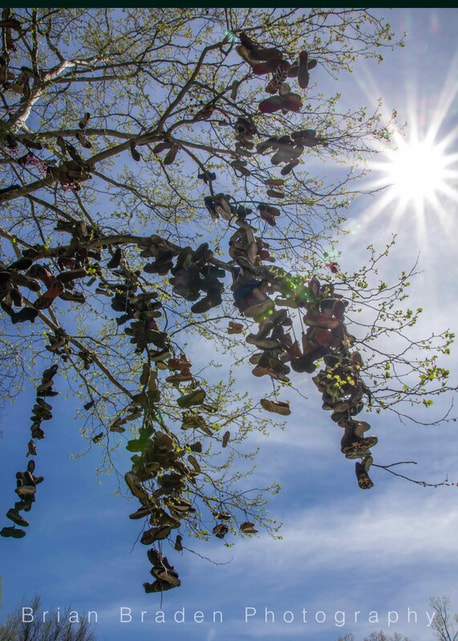 Travelling between Huntsville and Memphis on US 72 was a new experience for me. Although someone had warned me it was a dull road, I found it quite the opposite. The smooth pavement and light traffic made it an easy drive, and the charming Tennessee River farmland was a pleasant sight. I fell in love with the area instantly. As we approached the Mississippi border and passed by Cherokee, my oldest son in the passenger seat drew my attention to something unusual. At first, I thought it was a strange fruit hanging from a roadside tree, but as we whizzed by, I realized that these were shoes suspended from the branches. I longed to stop, but we were pressed for time. "We'll check it out on our way back," I promised, and we carried on towards Memphis. The following day, I kept my word. As we drove back towards Alabama in the mid-afternoon, I spotted the shoe tree and made a U-turn at the next crossover. I pulled over and grabbed my trusty Canon T-5, taking a few shots. The sun was high, and the air was fresh and cool after a major spring storm two nights before. The tree was beginning to bud with fresh shoots around the shoes. I managed to capture some shots despite the passing vehicles, and then we continued on with our journey. 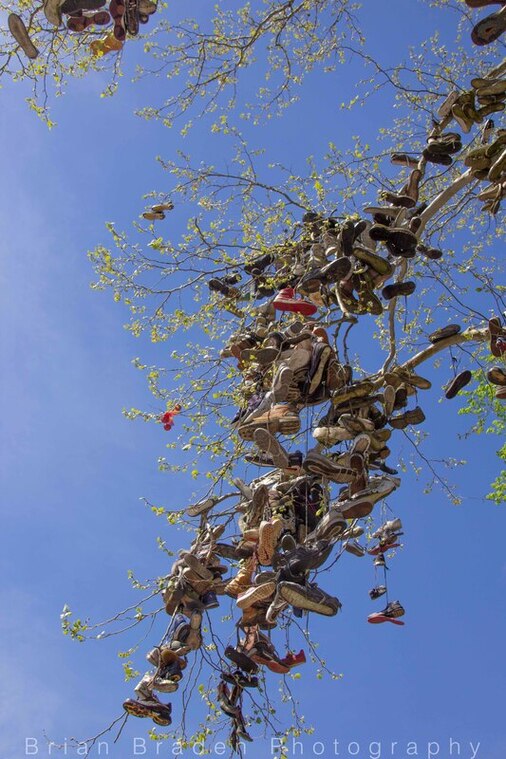 Before stumbling upon the Cherokee Shoe Tree, I had no idea it existed. However, after a quick Google search, I discovered that it has been around for quite some time, though the exact number of years remains unknown. The earliest article I could find dates back to 2009, from the Tuscaloosa News. The article includes this quote: "... tree comes an unspoken rule: Need a pair, take a pair. But if you can spare a pair, then do it." According to a 2018 article on OMGFacts, shoe trees may have originated during the Great Depression as a way for people to donate extra pairs of shoes to those in need. This theory makes sense on several levels. For instance, Cherokee is just one of at least a dozen shoe trees in the United States. Roadside America provides locations for many of them, and if you click on the link and examine the map, you'll notice that many are located along routes used by economic refugees during the Great Depression. These routes led from the Deep South and the Dust Bowl to places like California and Detroit, where jobs were available. Why do shoe trees still exist today? Is it due to nostalgia, novelty, tradition, or tourism? Some sources suggest that spiritualism may be the root cause. As for the Cherokee Shoe Tree, there is an eerie and sacred quality to it that I find hard to describe. Though this feeling was somewhat subdued by the bright midday light and clear blue sky, which favors reason and logic over mysticism. Under different lighting conditions, such as dim light or murky mist, other aspects of the human psyche may hold sway. These are the moments when both my camera and I yearn for. Yet, even under the brightest sunlight, the primitive magic of this place seeps through. I could feel it, even though my camera failed to capture it fully. Perhaps shoe trees tap into something deeply mystical and ancient that is rooted in our common humanity, reaching back to the dawn of our species. "Trees have been regarded as the first temple of the gods, and sacred groves as the first places of worship.; they are held in the utmost reverence" - Hughes and Chandran. The tree is a universal symbol of life and a life-giving force in nearly every culture and civilization on earth. In the Bible, trees are mentioned 525 times, second only to God and humans. Trees are present at the beginning of Genesis, with the Tree of Life and the Tree of Good and Evil. Christ referred to himself as a vine, and he died on a "tree" of sorts. Christians even have the tradition of the Christmas Tree, which has its roots in European paganism. Trees are also sacred to many other faiths. Tree planting as a sign of life is mentioned in the Koran, and Buddhism and Hinduism also revere trees in their unique ways. European pagans worshiped in tree groves and considered oaks and yews sacred. The phenomenon of shoe trees taps into this ancient tradition. The shoes thrown across the limbs and scattered on the ground resemble a sacrifice, a gift, and a ritual all in one. It represents an interaction between two species, one ancient and one ephemeral. These shoe trees seem more at home in ancient druidic groves than beside a modern highway. If a druid were present, what would they say with each tossed sneaker or pair of high heels thrown into the branches? "Great and Ancient One, these shoes are a gift to the future, for someone I will never know and who will never know me. Please hold them for me. Watch over and guard the shoes until needy hands pluck them from your branches, or until they fall from your limbs like rotting fruit. There, they will cover the ground among your roots, among the fallen leaves until the earth reclaims them like old bones. Remember us, Great and Ancient One, and whisper our names to the forest so that one day others might know we once walked here. "Remember us." Articles About Shoe Trees and Tree Stuff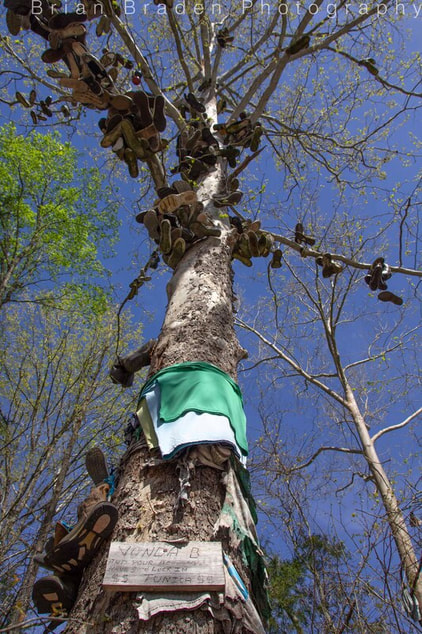 The Legend of the Shoe Tree Grows on America's Loneliest Highway. Shoe Trees in Michigan and the Rumors That Surround Them. Shoe Trees are Popping Up All Around The World. Witness the Shoe Tree of Middlegate. Shoe Tree. Alabama's Legendary Shoe Tree: Lost Soles of Just Old Sneakers Thrown Over A Limb? A Few Youtube Videos on Shoe Trees.
If you enjoyed this blog, please like the post and leave a comment or if you're feeling brave, share it on social media. This platform is my entire advertising budget and is how I share the word on my books. Also visit my Facebook, my author page and check out my photography book from America Through Time, "Abandoned Wiregrass: The Deepest South's Lost and Forgotten Places." All images and literature are protected under US Copyright laws and shall not be downloaded or reproduced without written permission by Brian Braden Photography.
"And when I die and when I'm dead, dead and gone There'll be one child born In our world to carry on, to carry on, yeah, yeah..." - "When I Die" by Blood, Sweat & Tears, 1968. A civilization must obey two basic rules if it is to survive: have children and pass along to those children the culture that made it successful. Fail either task, and the civilization falls. The "birth gap" is a quantitative measurement we are failing the first rule. Now, when you die, there isn't one child born to carry on. In fact, in Alabama, there is currently a 13% deficit in "carry on-ing." In recent years many have commented on the impending global population collapse. Perhaps no other journalist has put it in such clear focus as Stephen J. Shaw in his documentary "The Birth Gap - Childless World." In "Birth Gap" he explores several facets of the industrialized world's impending depopulation. We're getting older and having far fewer children. Since Shaw is also a data scientist, he gets to the heart of why this is happening and points to the grim mathematical outcomes if the trend isn't reversed. The graphic below from the Birth Gap website clearly illustrates the phenomenon. The redder and blacker the area, the wider the birth gap. Those red and black gaps are beginning to spread across the South, and the Wiregrass, like a pox. Alabama's birthrate (as well as that of the rest of the industrialized world) is falling below population sustainment level. This unabated decline will result in too few workers and consumers to support a healthy economy and aging majority. In the post-COVID era, we are just experiencing a taste of that now. Of note, the illegal immigrants living and working in the shadows across the Wiregrass are also experiencing the same birth gap phenomenon as the native born populations. When working on my book "Abandoned Wiregrass" I discovered far more abandoned and derelict houses than I ever thought possible. As I drove around the Alabama's cities and towns, I saw decrepit downtowns and once proud structures slated for demolishing, There are many reasons for abandoned homes, but I believe there is a correlation between all these abandoned structures and the growing "birth gap". If one extrapolates this trends, then it won't just be old derelict dogtrot shacks, like the one pictured here, that will litter the landscape. It will be modern homes and businesses, even those being built now, that will become vacant and fall into disrepair. This may be happening now. Simply put, there may be too many homes currently being built than will be needed. "Demand is strong right now because of an unusual emotional surge driven by the pandemic. Demographics, which are a better measure of housing demand historically, do not support more construction.." - Dennis McGill, director of research at Zelman & Associates. In Abandoned Wiregrass, I think I unwittingly caught the leading edge of this coming wave. I had over 700 images for Abandoned Wiregrass alone, mostly taken from 2018 thru 2020, and only a fraction were used in the book. If I stopped and took a photo of every abandoned home I ran across in the Wiregrass, I could fill multiple books. They are far more numerous than you can imagine, and the Wiregrass is not a unusual case. Taking photos of abandoned places has even become a sub-genre of photography called urbex (urban exploration). I don't know where this trend will end, but I know we will probably be better off with more children, not less. It would be nice to die knowing there was one more child to carry on. #urbex #abandonedwiregrass #birthgap #populationdecline #abandoned 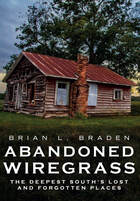 If you enjoyed this blog, please like the post and leave a comment or if you're feeling brave, share it on social media. This platform is my entire advertising budget and is how I share the word on my books. Also visit my Facebook, my author page and check out my photography book from America Through Time, "Abandoned Wiregrass: The Deepest South's Lost and Forgotten Places." regarding Social Media.Maybe its time to reevaluate my relationship with this time slayer we call social media. I started seriously writing in my 40s, just about the time social media became a thing. It still seems like a new thing to me, but its been around for well over a decade now. It started with a personal account on Facebook, and then it morphed to a few business pages for my writing and my old company Underground Book Reviews. Then I branched to Instagram for photography as well as a few minor apps that have come and gone. As for Twitter, it's been on and off but we are currently seeing each other...but not seriously. I leave apps like Discord and Tiktok to the next generation. Frankly, there are so many apps that I find it exhausting. Lately, I find myself asking "Why?" Why do I feel the need to even have one social media account, let alone three or four? Is my life richer for the experience? Was I better off before? What do I get out of all this time I've spent with my face in an app? Well, I enjoy seeing what my friends and relatives are up to. On second thought, do I really? There is an awful lot of drama on the inter webs, and if someone close to me really needs my help they know my number. I like being able to contact people. Well, some people. Actually, I have a phone, too. There are also a lot of people I don't want to be contacted by. I also don't enjoy people knowing too much about me. In fact, there is way too much information about be on the interwebs as it is. I like to post photos and look at friends' photos, but why am I really posting it? Some are for business, but as for the other images, like family events, I could just as easily text those the image to those who actually care to look at them. Maybe I should think twice about posting those photos. Isn't it all really about attention and vanity if am brutally honest with myself? After seeing all these Tiktok videos bleeding over onto Facebook, its becoming apparent our society is taking the definitions of "vanity" and "narcissist" to new levels every day. Speaking of vanity, nothing is more vain than being a political blowhard on social media (guilty, guilty, guilty). I don't think anyone really gives a damn what I think about politics, and that's okay. So why even post it? There is also news on social media, right? Social media is good for posting news stories, and therefore can be educational and informative. True, but we've also learned in the past decade a lot of that news and educational material can be false or heavily skewed. Perhaps I should be more careful when reading and posting. It also makes me uncomfortable to think about how much I whip out my phone just to mindlessly doom scroll, like a smoker taking another drag. I know its not healthy, I'm self-conscious of it, but I do it anyway. But if I didn't, how would I be able to look at the latest funny cat meme? Some days I think the only redeeming element of social media is funny memes and videos. I mean, there is some really funny and insightful stuff out there. Cat memes are truly the only thing I would miss about social media if I were to ever walk away. Is it even possible to walk away? It's everywhere. Many non-social media websites and apps have some element of social media built into their user interface. Social media seems to plug into every other aspect of our culture and lives. We're steeped in it like a teabag left too long in the water. It leeches us, and makes us physiologically pale. It has become impossible to extricate SM from the fabric of our culture. Case in point, as much as I hate to admit it, I will eventually share this blog post on social media. Can we really escape it? Should we even escape it? While I estimate I have lost a full year of productive writing because of social media, I also got a photography book deal because of it. Social media is truly a two-edged sword, with great promise and dangers. Personal Social Media Experience.My social media experience has two flavors: Personal and professional. The personal journey started with Facebook just about the time I retired from the military. In the years since, Facebook has been a great way to keep in touch , both through good times and tragedy. I've reconnected with old friends from high school, college and the service. I've made new friends from all over the world. Its been fantastic to connect with those that share my same interests, such as writing and photography. In the early days, before censorship, algorithms, privacy issues, and unbridled monetization twisted our social media experiences, it was fun. Social media has even taught me some life-lessons. Social media taught me my that my 20 years in the service, and perhaps my upbringing in rural Alabama, put me in a "bubble." In the military I thought (wrongly) most Americans viewed the world like me and shared my values. Social media's wide-open, uncensored early days showed me how naive I was. Social media taught me there are only two unwinnable conflicts: Nuclear war and debating on social media. I also learned through interactions on social media that the generations behind me are vastly different than those that had come before. They think differently and don't share many of the older generations' values by an order of magnitude, especially those who are college-educated. They read fewer books. Most have never read any portion of the Bible, from either a religious or secular perspective. Many are overly hostile to any religion without the least acknowledgement of faith's critical role in human civilization. Most American young college graduates are unfamiliar with the US Constitution or any of the important documents that led to its writing. They are technically far more savvy and advanced than those who came before, but lack the foundational culturally building blocks that define their western culture. In fact, many are openly hostile to their own culture and civilization. Labels and slogans have replaced objective truth and critical thought. All that is "new" is morally right. All that came before is "bad," including history, philosophy, faith, and even science. They are obsessed with race, genitalia, identity but they have no idea who they are, or what they want, or where they are going. They are easily outraged and offended and feel like mob in search of a riot. Once again, this is a general observation and does NOT apply to everyone younger than me, especially any young people currently reading this - you are special and definitely the exception. As a result, I found myself interacting less and less with some younger people on social media because, frankly, they aren't much fun and they scare me just a little. I also found many people my age also interact less often on social media, too. Maybe we're been turned off by the rise of censorship and fact checking. I think a lot of older people really don't want to support many of these platforms. Social media companies have proven untrustworthy and don't have their customer's best interest in mind , and they've proven too cozy with big government. Taken as a whole, my personal social media is locked down tight and I generally restrict it to Facebook. If one is not an immediate family or a close personal/non-work friend, you're on the "acquaintance /restricted" list. Sorry, it's nothing personal, it's simply privacy and protection. The older I get, the less I'm interested in the world seeing my personal business. Also, I see many people getting hacked, especially older people, and I want no part of that. I still post family events, personal achievements, the occasional funny meme and even political opinions, but not very often. My posting is becoming less and less as the years go by. I see a day when I'll walk away entirely. The only reason I'm still there is because of my writing and photography, but that is hanging by a thread. Writing and Photography Social MediaWhen I started writing my fellow writers said I needed a platform. So I got a platform. Its also how I got into blogging. At first, the platform-thing worked pretty good. Prior to 2016 I used to sell books using Facebook as an advertising tool. I used to get hundreds of clicks when advertising on that platform. In fall of 2016 everything dried up. It was like someone threw a switch. Now, an advertising dollar doesn't stretch near as far on Facebook. I abandoned Twitter in 2016 when the trolls and garbage became overwhelming. I recently returned hoping under Musk the platform had gotten better. It didn't and it's clear I'm not going to find a readership out there. In the early days of Instagram, one of my images could get 20 or more likes easily. Today, I'm lucky to get 6. In all these SM cases, it became clear there was an algorithm behind the scenes that needed appeasing, and obviously I wasn't appeasing it. I began to feel like I'd been put in a digital cage, and the price for breaking out was too high. It was also obvious that algorithm could change without notice. It also became clear in the revelation of the Twitter Files, that shadow banning and "social-media scores" were actually real. And I don't want to appease Algorithm. I'm sick of the Algorithm. I keep hearing to get a social media following you need content - lots of content. I have content, its called my books. I can either write and take photos, or I can spend hours upon hours honing an online presence in hope of appeasing some hidden and mysterious daemon to reach readership. I don't have the time, energy or inclination to spend the precious moments of my life trying to get a few more clicks. Sure, I'd like to sell more books and prints, but it's not worth it. In fact, it destroys my creative process. I'm good with that. I'm at peace with that. So what's my advertising and marketing plan on social media going forward? You're looking at it. I'll continue to blog here, and occasionally post those blogs to Facebook, Instagram and maybe Twitter. I'm also on Vero, but that place is a ghost town. Mostly what I plan to do is write and take photos and create. That's where I want to apply my efforts. I also plan to use in-person appearances to get the word out. The Way ForwardI think social media, and the internet in general, held so much promise in the beginning. In the early days, before the corporate giants took it over, it was algorithm-free. No one and nothing stood between you and everyone else. There were no filters, no shadow banning, no fact-checkers, no social credit scores, - just you and the rest of humanity connected instantly. The people were different back then, too. I don't fully understand the people on the other side of the screen anymore. What I see out there doesn't bode well for our species. I really don't want to interact with those people for fear I may become one of them. I'd rather interact with those people I see out here in the real world, those that smile and shake your hand and have manners. You are welcome to disagree with me, but I've reached a point in life I've come to trust my own observations and instincts. Social media and the internet was once wonderful. And now it's gone. I'll hang around the social media interwebs for professional reasons for another year or two, and see if anything changes. After that, I see no reason to stay. I am a member of Gen X, the last generation who will remember the world before the internet and social media. Last I checked, the real world was still there. I think I'm grab my camera, hop on my motorcycle, and go explore it. I'll crawl back into my bubble and shadow ban the world, thank you very much. Maybe I'll drop a post on Facebook about it. Maybe I won't. (picks up phone and begins to doom scroll) #socialmedia #essay #culture #facebook #twitter #instagram #vero #theillusionexotic 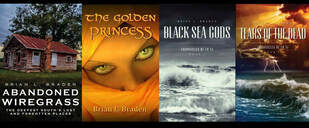 If you enjoyed this blog, please like the post and leave a comment or if you're feeling brave, share it on social media. This platform is my entire advertising budget and is how I share the word on my books.  passion [ pash-uhn ]; any powerful or compelling emotion or feeling, as love or hate; strong sexual desire, lust;.a strong or extravagant fondness, enthusiasm, or desire for anything; the object of such a fondness or desire; the narrative of Christ's sufferings as recorded in the Gospels. Synonyms: fervor, zeal, ardor. From Late Latin passionem (nominative passio) "suffering" or "that which must be endured." This isn't about the passions of sexual or romantic love, nor does it concern the Passion of Christ's crucifixion. I'm talking about the passions of that capture the imagination, that compel the curious people to seek learning and excellence and diversion. These passions can drive a man to build entire landscapes in his basement just so tiny trains can travel through them, or compel a woman to spend her free time painting water colors of humming birds, or for parents to follow their kid's travel softball team around the country every weekend. It's the kind of passion that torments the writer to edit a manuscript all night, or a photographer to buy a new lens she really doesn't need, or a young girl to a buy a new book when she already has a shelf full of the unread, or a runner to attempt his first marathon. Passionate people fall headlong into an idea, a concept, an art, a project, a sport - anything, and completely surrender to it. The Passion SpectrumPassions fall into many categories, but I generally categorize them into this spectrum: 1) ideas, 2) people and 3) things. A person can have passions across this spectrum (and usually do), but tend to mostly favor, or begin, in one category or another. Books, writing, cinema, politics, poetry, and music are examples of idea passions. Public service organizations, social clubs, sports and scouting are examples of people passions. Cars, quilting, model rocketry, computers and scrapbooking are examples of thing passions. These categories spill over and blur into one another in complex ways. An abstract idea or a thing or object will usually manifest in a social aspect like clubs, organizations, Facebook pages, etc. Passions can be hobbies, they can be professions or even both. Passions can be weekend diversions or all-consuming obsessions. Passions can be expensive. Passions can be age-dependent, and can pass as quickly as they come. Passions can evolve. Some people wear their passions openly, while others keep them hidden. BlessingS and Curses A passion can be pleasant diversion, an accessory to life's otherwise mundane drudgery. These necessary loves are therapeutic for person's mental health. Passions can often be unhealthy obsessions that eat away at one's life like an addiction. These passions cling to us like an abusive lover. Often times, people don't know when their passion has crossed that line, it simply happens. Those around you will sense it first. Sometimes, interventions are necessary. Go to a garage sale, pawn shop or thrift store and you may see the remnants of such interventions. Truly passionate people tend to get carried away. Get them to talk about their passion and you'll understand what I mean. They simply won't shut up about it. Of this, I am guilty. Over the years, I've learned to look for the tell-tale drifting eyes, a glance at the watch or phone, and the steady increase in the listener's "uh-huhs." When I see the signs I realize I might have gotten carried away. I look for a polite way to change the subject and let my victim gracefully disengage. Its a level of self-awareness I've tried to improve on over the years. In most situations, at least outside the internet, it can be difficult to find people who share any of your passions depending on how unique, elite, or expensive the passion is. Deeply passionate people often learn those they share their lives with don't share or understand their passions. At best, their loved ones listen patiently and try to understand that which must be suffered. Sometimes, the partner's passion is merely tolerated, or may even be a source of friction and conflict. Maybe the passionate find it better to remain quiet. Perhaps it easter to be alone then be misunderstood. One's passion can be isolating, and self-validation often times must be enough. That's why meeting someone who shares your passion is one of life's rare gifts. I think that's were there are so many clubs and organizations centered around passions. Even introverts want to share common experiences. It can be exciting when you finally meet someone who shares your passion. Its like taking long, cool drink of water. You can't drink it fast enough, and you can't get full enough. You know it may be a long time before you can find another watering hole. What's your passion? If you don't know, just go online to Google or Amazon, and the "Algorithm" will quickly tell you what it thinks you passion might me via ads, pop-ups and suggestions. The internet has made it easier to not only find others who share your fervor, your zeal, your ardor. It's also made it easier to improve at whatever you love (Youtube), or at least to spend money on it. I hope your passion makes you happy, whatever it may be. Thank you for stopping by, and sharing a little bit of my passion. #passion #hobbies #books #writing #essay #photography #abandonedwiregrass 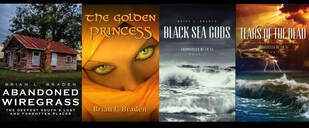 If you enjoyed this blog, please like the post and leave a comment or if you're feeling brave, share it on social media. This platform is my entire advertising budget and is how I share the word about my books. Also visit my Facebook, my author page and check out my epic fantasy novels available on Amazon. Day job and family has kept me busy this week, so not a lot of time for photography and writing. I've been helping my daughter learn to cook (Actually, I just drive her to the store so she can buy ingredients and then I eat what she cooks. I get the easy part.) We were at Wal-Mart, I noticed all the bare shelves. Like you, I've been noticing this for quite some time. I'm over 50, and this is a new phenomenon in my lifetime as an American. It harkens back to stories my grandparents told me of their childhoods, and it makes me uncomfortable to ponder it. I don't like it. Not one bit. One can debate why this is happening, and I'm sure the reasons are complex. It's the baby formula that truly disturbs me. It hits me in a place only a parent can understand. The lack of outrage by the American people, and lack of urgency by our government, disturbs me even more. I wandered around Wal-Mart and took a few photos of the bare shelves. Inventories were thin on many shelves that weren't completely bare. However, one section had shelves almost overflowing. Its that same section that never seemed to run "dry" even during the height of COVID lockdowns. Beer and wine shelvesNo baby formula. Plenty of booze. It's just a snapshot in time, a few photos taken during one visit to a supermarket. I'm not sure what that says about us as a culture, maybe nothing. I just can't quit thinking about it. You can draw your own conclusions. See you next week. #babyformula #shortages #rationing #walmart #economy If you enjoyed this blog, please like the post and leave a comment or if you're feeling brave, share it on social media. This platform is my entire advertising budget and is how I share the word on my books. Also visit my Facebook, my author page and check out my photography book from America Through Time, "Abandoned Wiregrass: The Deepest South's Lost and Forgotten Places."
"Every generation Blames the one before And all of their frustrations Come beating on your door." - Song "The Living Years", B.A. Robertson / Mike Rutherford The Generation GapsSince the Baby Boomers entered the world in the years immediately following World War II and were old enough to snatch the microphone from the Greatest Generation, they proclaimed how different they were from all who had come before. They heralds of the Age of Aquarius, the Real Thing. The Boomers came of age in the wealthiest and most powerful nation in the history of our species, following the bloodiest and most savage war in the history of that same species. They knew they were smarter than their parents. They knew they would usher in world peace, right the wrongs, and make everything fair and equitable. In retrospect, it didn't quite turn out that way. Like their parents, the Boomers did great things and had glorious failures. However, they weren't truly any different from those who came before. The 20th Century was different. Vastly different. It was the century that changed everything about humanity, and nothing. The Greatest Generation set the century in motion, but the Boomers were stage center for most of it. They WERE the children of the 20th Century. Greasers and Sock Hops gave way to Hippies and free love, and that gave way to Yuppies and bottled water. During the height of their reign, they created the 1970s, which forged the modern culture we live in today. They even invented the concept of the "Generation Gap." The term "Generation Gap" is a modern construct. In the millennia before the Industrial Age, little changed from generation to generation. It is only as result of breakneck technological change since the late 19th century that our humanity has definable mile-markers to record the pace of change within a human lifetime. The broad-brush strokes our culture uses to paint and label an entire generation aren't necessarily accurate or fair. Generations are made up of individuals, no different than those that came before, only exposed to a different set of circumstances. Same fallible humans, same rules of behavior, only with new toys and trapped in the prison of their own time. Baby Boomers weren't any different from the Greatest Generation, they only had a different starting point and faced different circumstances. The Gen-Xs and Millennials were the same, too. However, I think this might be changing. Gen-Z, or whatever culture is labeling those who follow next, are truly different. The technology that surrounds them isn't just changing, its changing them. Boomers and Gen-X's birthed the Information Age. Those who follow are being assimilated by the Information Age, transformed in every way imaginable into something truly new. It's happening now. You are seeing it. Humanity is on the cusp of permanently changing: mentally, spiritually and physically. Some of it is happening by circumstance, your children are becoming it mentally and physically wired. Yet, it is also beginning to happen by choice. “On the scale of the discovery of fire, the wheel and cultivation of crops, the interconnection of humans will be judged as a very important step toward becoming the beings of the universe that we are destined to be.” - Ray Schroeder, associate vice chancellor for online learning at the University of Illinois, Springfield. (Pew Research Center, Oct 2019) Unintentional changes.If you're under 30, you were practically born holding a personal electronic device (PED). All of this device usage is changing us. German researchers found too much smart phone usage actually shrinks parts of the human brain. This damage is similar to effects of drug-addiction. In children, this rewiring is more pronounced, and may forever change how a child will develop into an adult. Hungarian researchers found children who spent at least 15 minutes a day on a PED for over a year processed information differently than children who barely even used a PED. Device-wielding kids tended to see small details first, and seemed to miss "the big picture" when it came to problem solving. Being mired-in-minutia wasn't the only change in PED-using children. Screen time also affected happiness in teenagers. A San Diego University study found that happiness rose steadily with screen time. "Study participants born after 2000 were less satisfied with life, had lower self-esteem and were unhappier than those who grew up in the 1990s." Intentional Changes: Body Modification to TranshumanismInformation technology might be unintentionally changing the next generation, but what if they want to be intentionally changed? We've seen the rise of body modification and trans-genderism. Body modification is evolving beyond tattoos, piercings and even sex-change operations. Now enter the "trans-humanists." We entering a time where people are beginning to cybernetically modify their bodies transhumanism (TH), social and philosophical movement devoted to promoting the research and development of robust human-enhancement technologies. Such technologies would augment or increase human sensory reception, emotive ability, or cognitive capacity as well as radically improve human health and extend human life spans. Such modifications resulting from the addition of biological or physical technologies would be more or less permanent and integrated into the human body.  Example of extreme body modification: Eric "Lizardman" Sprague, a performance artist in Austin, Texas (photo from his public website) Example of extreme body modification: Eric "Lizardman" Sprague, a performance artist in Austin, Texas (photo from his public website) Robotic and computer augmentation of the human body and mind is becoming more common and more advanced. From sophisticated prosthetics to computer chip implants, humans are beginning to alter their own evolution. Much of this has been driven by medical necessity, such as helping amputee victims and those paralyzed, Now, it is taking on a cosmetic and voluntary element. Long speculated about in science fiction, The next generation is apparently moving toward embracing TH. Why? Well, why not? If one can readily change physical appearance and genders, what physiological or cultural barriers remain to changing the physical essence of one's traits as a species? Body modification comes in many forms. Perhaps the easiest and most accessible form is cosmetic body alterations. Body alterations have existed for thousands of years, and often have cultureal and religeious significance, such as neck elongation and circumcision. Body alterations are usually not transhumanism, but transhumanism is always a body modification. Body alterations such as tattoos and piercings, logically may become a gateway to greater modifications. In 2017, John Hopkins University found up to 42% of all adolencence already had a tattoo or piecing, and over 50% were interested in getting one. The growing phenomenon of extreme body alterations crosses the line into transhumanism. While mostly cosmetic and having no practical purpose, extreme tattooing, implants and appearance-altering surgery, and self-mutilations have the effect of physically distancing an individual from their traditional humanity. Some may argue the effect is intentionally dehumanizing. Cosmetic body modification is only "skin deep", but is perhaps symbolic of deeper changes in the modern culture. " If a generation is so open to cosmetically altering their bodies, how much farther would they go? Another gateway concept into transhumanism is transgenderism. From the Bradley University "BodyProject": We tend to think of human bodies as simply products of nature. In reality, however, our bodies are also the products of culture. That is, all cultures around the world modify and reshape human bodies. This is accomplished through a vast variety of techniques and for many different reasons, including:
Transgenderism is defined as one feeling different than the gender they were born as. A transexual is a transgender who chooses a sex-change surgical procedure. Sex changes are body alterations, and not transhumanism. However, they are indicative of a growing acceptance of permanent body changes in our culture. In 2019, over 11,000 Americans underwent sex change operations. This is growing by almost 15% per year, and by 2030, the gender-reassignment industry will be approaching a billion-dollar market. Gender fluid is a term unheard of only a few years ago, and now is now a way of life. Body appearance and sexual identify were concepts that, only a generation or two ago, were rigidly dictated by culture and considered permanently assigned at birth. Now the fluidity surrounding these concepts are embraced and celebrated. Appearance and gender are plastic, temporary concepts changed at individual whim. So why not the concept of "humanity" itself? Transhumanism -The Ultimate Body Modification.  Neuralink Corporation is a neurotechnology company that develops implantable brain–machine interfaces. Its a "Fitbit in your skull." Neuralink Corporation is a neurotechnology company that develops implantable brain–machine interfaces. Its a "Fitbit in your skull." TH comes in many forms, and science fiction has explored many of them, from cybernetics to genetic engineering. Now speculation has become reality. Many of these enhancements and changes can be seen in medical fields, but as the technology advances and becomes more affordable, it is spreading into the consumer market - and then it becomes a choice. Choices become new realities. Medically, genetically and cybernetically altered humans will live longer, be stronger, faster, more intelligent than those who have come before. They will simultaneously exist in the real and virtual worlds. They will become specialized and highly differentiated as we branch out into the solar system. These changes will happen earlier in the human lifecycle, perhaps even before birth. Humanity may even split into new species. This is happening now. Transhumanism and the "Age of Humanity X" is rising. Soon we will be defined as versions associated with alterations, and not the time period we are born to. What they do, the history they experience, and how they see themselves will not only be associated with shared culture and history, but by their similarities and differences down to their core being. There may even come a day (a day many who are reading this blog may live to see) where a future generation may no longer consider themselves human at all. We ourselves become the AI. We may become "The Rise of the Machines." We ourselves may become the alien invasion, or our own saviors. It all begins with a simple choice, and then the generation that follows truly is different than what came before. #cyborg #transhuman #transhumanism #human #humanity #essay #transgender #trans #bodymodification #generation #generationgap #genx #babyboomer #millennials #genz #bookofbobafett #bionics Please join me on my journey. If you enjoyed this blog, please like the post and leave a comment or if you're feeling brave, share it on social media. This platform is my entire advertising budget and is how I share the word on my books. Also visit my Facebook, my author page and check out my fiction books here book here.
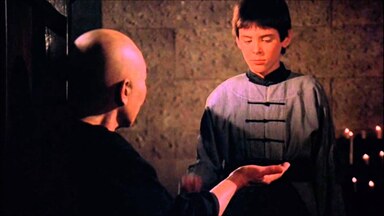 Snatch the pebble from my hand. Snatch the pebble from my hand. I used to teach pilots to fly. I'd always ask my student pilots the same question, "Do you want to be a pilot, or do you want to fly?" Most didn't get the question, so I rephrased it in the words of the immortal fighter pilot Colonel John Boyd, "Do you want to do something, or be someone?" This is a lesson, a concept so profound, I dearly wish I had learned in my youth. If you're looking for a label, a status symbol, you will never be truly fulfilled as a human being. If, on the other hand, you are seeking a path to self-fulfillment and personal excellence, you will be a happier person. The titles and labels will occur as a result of that journey, not as a goal. I would tell my students that if they were chasing a label, I couldn't help them. If they were choosing a path that would lead to a love of flying, then I could help them along on their path. Then I would flick my fu-man-chu and ask them to snatch a pebble from my hands (if you got that, then you are old as dirt, too.) The title "pilot" was just a milestone along the road, not the destination itself. So are the labels "author" or "musician" or "photographer" and why doctors use the term "practicing medicine." Attaining a title or label always leads to the perplexing personal question, "Now what?" 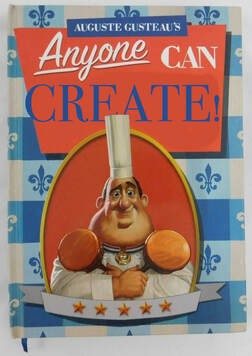 Back in my Underground Book Reviews days, I once attended a writers' conference hosted by a major university, where I encountered a memorable individual. He was not a only a writer, but also an English professor. It was his opinion there were way too many writers, most of which had no talent and wrote awful books. He felt there should be a way to keep these independent authors from publishing, because they made it more difficult for readers to find the good authors like him (of course). He was dead serious. It never occurred to him that he may be among the ranks of those great unwashed hordes of terrible independent authors. They shouldn't have an opportunity to publish, but he should. The professor had a point, albeit a twisted one. Someone once said talent is cheap. My life experience teaches me this is true. My life experience also teaches me information is cheaper. If something is made or distributed with a click of a mouse, its cheap. The Information Age has dramatically lowered barriers to entry for creators and artists of all genres. In other words, its made content creation cheap. Anyone with a internet connection and a word processor can be a writer. Anyone with a smart phone and a Tik Tok account can be an influencer (whatever the hell that is). Anyone can create. The barbarians have crashed the gate. That means there is a lot of crap out there. Go browse Youtube and Tik Tok and you'll find crap content. You'll also find much more mediocre content. You might even find a few gems, but you have to wade through the slush pile first. This is simply a fact of life in the 21st century. We are saturated by information every minute, every hour, every day. There are no more real gatekeepers for information. If you're a writer or a musician you know this better than anyone. Writers learned this first when Amazon and Kindle came along. Now with the advent of streaming services like Spotify, musicians have followed writers down this over-saturation path. Long gone are the days when getting published meant something. There are still traditional publishers, but even their books are harder to sift through. There are far more books in print and digital than ever before. The title "author" is cheapened by being so common, so accessible. To this I say, so what? Because it is the act of creation that is truly precious. The experience is priceless to the writer themselves. It goes back to the question: Do you want to do something, or be something? The act of creation can be a reward unto itself. In fact, it MUST be the reward unto itself if one wants to endure and improve. No one reads books to get famous, we read for pleasure and information. Writing can be the same. 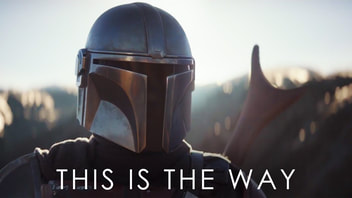 I take my inspiration for being a writer from several musicians I know in local bands. They practice regularly to continually improve their art, and are always striving to be better. They play in the same local club circuit to the same enthusiastic crowds. They have day jobs to pay the bills. They play for the love of playing, for the experience of playing. Stardom isn't their goal. They are musicians, not rock stars. Create. Improve. Repeat. This is the way. This is the bedrock from which everything else springs, whether that results in commercial success, or simply your next gig or independently published short story compilation. Labels are cheap. Information is cheap. Talent is cheap. The journey is priceless. Do something. Embrace that something with all your heart, passion and energy. Immerse yourself in your art, and you shall transform and become something. #writing #creation #publishing #kindle #amazon #contentcreation #writersjourney #content #selfimprovement #anyonecancreate Please join me on my journey. If you enjoyed this blog, please like the post and leave a comment or if you're feeling brave, share it on social media. This platform is my entire advertising budget and is how I share the word on my books. Also visit my Facebook, my author page and check out my fiction books here book here.
God said to them, “Be fruitful and multiply; fill the earth and subdue it... - Genesis 1:28
THE FERMI PARADOX
Why haven't we detected an alien civilization yet? That's a big question. Scientist put forward two hypothesis: 1) The universe is stupidly enormous and we've only been seriously looking for less than a human lifespan or...2) Something wipes alien species out before they really get started. Both answers might be right, but let's talk about the second possibility, otherwise known as "The Great Filter".
The Great Filter theory, otherwise known as the Fermi Paradox, states that alien civilizations are snuffed out before they can attain significant spacefaring/galactic empire-level evolutionary levels. Otherwise, we would have detected them by now. They could be wiped out by natural events (celestial impacts, disease, volcanos, gamma ray burst, supernova, etc) or wipe themselves out (war, malicious artificial intelligence, etc). What makes this theory interesting, is that humanity might have already survived several natural Great Filter events. We also may be approaching an unexpected, and self-inflicted, Great Filter event.
THE CYCLIC CATACLYSM THEORY OF HUMAN EVOLUTION
Up until recently, mainstream historians have held the "Gradualists Theory": They believe human history is gradual, continuous evolutionary line from the Stone Age to the Space Age. This theory begs a question: If humanity reached its current evolutionary form over 300,000 years ago, but only appeared to come out of the stone age a mere 6000 years ago, what were we doing with ourselves in all the time before? No one figured out agriculture, the wheel, and metallurgy in all that time? Humans just sat on our stone age asses for over a quarter of a million years? This flies in the face of what we know about inherit human nature. Now, there is a new theory gaining traction based on emerging evidence, the Cataclysmic Theory of human civilization.
A new group of scientist, anthropologist and historians believes human history isn't a continuous line, but a series of cataclysms and restart cycles dating back tens of thousands of years. Global-level natural disasters, far more destructive than anything we've encountered in historical times, repeatedly drive our species to extinction's edge. They also wipe out all the progress we had made to that point, and reset us to a stone-age baseline. We suffer from species-level amnesia. They believe that last great event occurred at the beginning of the Holocene epoch 12,800 years ago when massive comet impacts peppered the planet, wiping out 60% of the earth's megafauna. We survived, but barely. This cyclic Cataclysm Theory of human history fits nicely in the Fermi Paradox. Humanity has essentially survived several natural Great Filter events. Now, we have advanced far enough technologically we threaten ourselves with several possible Great Filter events. Many people would agree the threat of nuclear annihilation would probably be the most feasible way humanity could wipe itself out, but there are other threats, too. Some believe man-made climate change will soon destroy us, or we will be destroyed by our own artificial intelligence. Maybe, just maybe, it is something else ushering us to our doom.
CIVILIZATION'S TWO PRIMARY RULES
I personally believe a civilization must do two things in order to survive: 1) Have children. 2) Instruct those children in the arts and sciences that made their civilization successful in the first place. I call these Civilization's Primary Rules. Break even one of these two rules and your civilization will eventually collapse. All of earth's civilizations are now breaking the first rule, and Western civilization is breaking both. Let's save the second rule for another blog post, and just focus on the first rule because it is an objective standard.
We are in the midst of a global population collapse, and it's not good. In fact, I believe we might be entering a Great Filter moment. Globally, people are having fewer children. Dropping fertility rates are happening for many reasons, which are hotly debated, but I'm going to break them down into two categories: choice and environment.
CHOICE
First, people are choosing to have fewer children or not to have any children at all. This is a global phenomenon, more pronounced in developed countries but rapidly catching up in developing countries.
In Japan, for example, the factors "include the declining marriage rate, an increase in the average age of those getting married, economic burden, childcare burden, later child-bearing, and infertility." In sub-Saharan Africa, where birthrates are still high, they are dropping rapidly. "First, an increase in the proportion of the population living in cities. City dwellers have fewer children because they live in smaller housing units, they have more of a consumer lifestyle and are less able to rely on the community than in the country. Then there is the development of women’s employment. They increasingly work in places where they cannot bring their children along with them, unlike in the field, for example. There is also improved education for girls. Educated girls have a better understanding of their rights in the area of contraception and of what that can mean for their financial and social independence. Lastly, there is the reduction in the age difference between spouses. This entails a greater sharing of modern values and therefore less of a desire to have many children." There are other factors, too. Easier access to contraception and abortion have played a role. Child-bearing age women are pursuing careers instead of family. Men are choosing not to marry as if offers fewer and fewer advantages, and higher risks to them when compared to previous generations.
Not only is choice a factor, but now there is a growing awareness that environment may play a significant role in declining male fertility. The modern world is robbing us of our ability to reproduce.
ENVIRONMENT
Recent research by a team led by Shanna H. Swan, Ph.D published a study proving a 59% drop in male sperm production since 1973. There has been a corresponding increase in miscarriage rates among women. Humans globally are becoming less able to have children at a rate of 1% per year. In Dr. Swan's (See video below) words, " Everything seems to be progressing at the same rate of deterioration for human reproductive function." Why?
This drop has happened in two generations. Dr. Swan divides environmental factors into two factors: lifestyle and chemicals. In terms of lifestyle, such factors such as obesity, smoking, binge drinking, and stress can all have a significant impact on male and female fertility. In terms of chemicals, there has been a significant increase in chemicals that influence human hormones. These human hormone "hacking" chemicals are called endocrine disrupting chemicals (EDCs). These EDCs impact the formation of testosterone and male development in utero. Phthalates, a class of WIDELY used plastics, can cause something called Phthalate Syndrome (PS), stunting male development in utero. PS has been found in humans. Women with high phthalates during pregnancy have had measurable higher rates of boys with underdeveloped genitals, which opens them up to a host of reproductive health issues and low sperm counts. Where do you find EDS? Phthalates alone are in plastics, clothing, vinyl, cosmetics, creams, scented laundry soaps, pesticides, and in any foods that are stored or pass through phthalate-containing material. Phthalates are only one class of EDCs, there are many others that permeate our environment and have varying effects on the human reproductive system. The bottom line: The ABILITY for humans to have children has dropped by 1% a year since the 1970s. This, coupled with CHOICE, has created a significantly declining birthrate for our species. Some of you might be asking, "So what?"
FEWER PEOPLE, SO WHAT?
Dr. Jordan Peterson, in the interview below, makes a point that mainstream science has been sounding the alarm of over-population since the 1960s. These dire predictions never came to pass. As early as the late 1990s, several notable voices, such as Pat Buchanan, have sounded the opposite call - a population collapse was on the way, led by the affluent western democracies.
Its possible global human population may never top 9 billion. You and I may be living through the era with the highest human population that may ever be. Imagine you're in an airplane, that has been skyrocketing at full power ever higher and higher. Then, the pilot cuts the engine. You don't immediately fall. In fact, you keep climbing, albeit at a slower and slower rate, until you hit your apogee and then begin the descent. Human population is now in that upward coast phase. Our momentum is still carrying us up, but only for a little while longer. The real issue for humanity is the engine may not restart, or at least in time to avoid disaster.
What are the implications of a global population collapse? Carefully read these excerpts below and ask yourself if any of it sounds familiar.
"A rapidly aging population means there are fewer working-age people in the economy. This leads to a supply shortage of qualified workers, making it more difficult for businesses to fill in-demand roles. An economy that cannot fill in-demand occupations faces adverse consequences, including declining productivity, higher labor costs, delayed business expansion, and reduced international competitiveness. In some instances, a supply shortage may push up wages, thereby causing wage inflation and creating a vicious cycle of price/wage spiral." - Investopedia, 2021 "Today, there are more than 46 million older adults age 65 and older living in the U.S.; by 2050, that number is expected to grow to almost 90 million." - Rural Health Information Hub, 2015 "The social and economic costs of such an abrupt change in such a historically short time are difficult to evaluate: its impact on the pension and health system, family structures, labor productivity, etc. is enormous. Japan, followed by many other countries, is heading towards a path never experienced in human history, and that appears to be full of unknowns." - Institute for Family Studies, 2017. Does this sound like the labor and supply chain disruptions we're experiencing right now in the wake of the COVID pandemic? It does. COVID, and the global lockdowns that followed, gave us a sneak peak of what we are about to endure permanently in the coming people-shortage. 1. Labor shortage - Too few working-age people. 2. Declining productivity. People in lock-down is the equivalent to large numbers of older people retiring out of workforce. 3. Supply shortages. 4. Wages and prices being pushed up (inflation). (If you expect remote working and robots to solve these problems, good luck. However, we'll save that discussion for another blog.) Too few young, productive workers and too many older people to take care of; the Great Lockdowns of 2020-2021 gave the world a sneak peek of what is waiting for us in the coming decades. Yet, this isn't the truly concerning part of this story. You know what else didn't happen during the Great COVID lockdown? There was no expected baby boom. Millions of young couples were shut up together for months on end, and yet the baby boom never materialized.
FEWER PEOPLE MEAN FEWER PEOPLE.
Fewer people mean few babies. Fewer babies mean fewer adults, which then leads to fewer babies. Simply put, this is a trend not easily reversed.
"Low birth rates and below replacement level fertility rates in the U.S. are probably here to stay for the foreseeable future." - Brookings Institute, 2021. "The U.S. fertility rate hit a record low in 2020 — just as it did in 2019, and 2018. Although the COVID-19 pandemic seems to have accelerated this decline, the drop has been underway for years. The total fertility rate — the average number of children a woman is expected to have over her lifetime — now sits at 1.64 children per woman in the U.S. Not only is this the lowest rate recorded since the government began tracking these stats in the 1930s, but it’s well below the so-called “replacement-level fertility” of about 2.1." - fivethirtyeight.com, 2021 "The problem with low fertility is that it reduces population size not at all ages but only among the young. Low fertility produces an age structure that creates a momentum for future population decline, a situation that must be stopped at some point if the population is to be demographically sustainable. Also, populations with low fertility can fall in size at an extremely rapid rate. The longer low fertility is maintained, the harder it becomes to reverse population decline. " - PBR.org, 2001. Some of the cited articles say population decline may not be a bad thing, and we can always chose to reverse the decline at some point. NONE of these articles refer to the growing research that, due to the influence of EDCs, may not be able to reverse the decline, at least not in time. Dr. Swan states EDC-driven fertility damage can be reversed in two generations. In two generations from now humanity will be in real population decline, and significantly older. This assumes no major cataclysm will significantly thin our numbers, like a real pandemic or another major world war, or a celestial impact. Mathematically, we are approaching a window, and that window is closing.
WHERE DOES THIS END?
Is humanity approaching a new chapter in the boom-bust cycle presented in the Cataclysm Theory? Could this be more than just the next iteration in the cycle, but our species actual Great Filter comeuppance? This time, are we heading for a population cataclysm, a "Children of Men" collapse driven both by choice and environment? I don't know, but I would say such a future is highly difficult to imagine given that our planet has almost 8 billion people and still climbing. I would also say, however, those that foresaw and warned about the present population declines were once mocked, and they were right.
If this is the Great Filter moment for homo sapiens, it's not too late to reverse course. Governments are slowly starting to recognize the problem, and some are shifting policy gears. Across the globe, nations are starting to look at ways to encourage child bearing, where before they actively discouraged it. Where will these efforts lead? It's too early to tell. Maybe this is our Great Filter moment, one perhaps other galactic civilizations didn't survive. They didn't blow themselves up, or were wiped out by a comet impact. Perhaps they just became too steeped in their own lives, and forgot civilization's two primary rules. They saw procreation as something to be feared and avoided, like a disease. Their ranks thinned until the light of their once thriving civilization just faded away.
The opinions expressed here are solely my own and do not represent any organization or group. If you have been triggered, you may vent and rage below in the comments section.
If you enjoyed this blog, please like the post and leave a comment or if you're feeling brave, share it on social media. This platform is my entire advertising budget and is how I share the word on my books. Also visit my Facebook, my author page and check out my fiction books here book here. I took a vacation. If you are reading this, thanks for coming back. It's been a few weeks since I checked in on the blog. I took some time off of everything...work, writing, everything. I spent a lot of time with family. Mostly, we did nothing. When we weren't doing nothing, we did a few things. I got sick. I got better. I slept. I raked leaves. I even rode my new motorcycle a bit. Mostly, my family just enjoyed each other's company. I really needed to shut down for a while, and to be honest, I wasn't quite ready to spin back up in the New Year. That includes this blog. I've had this overwhelming urge to slow down. Way down. Like "retire" slow down. Shut down. Hole up. I've sorta tuned out of everything and just concentrated on being. At this point in my life, a permanent slowdown isn't realistic or feasible. So what's next? My day job seems to take the lion's share of my time these days, but I'm working hard to make sure I carve out time for other priorities in 2022. These priorities are in no particular order, because they are all important in a different way. Many of them are also interrelated and connected. They sort of define my vision for the coming year. Writing - Finish what I started: The Chronicles of Fu XI, Book IV is 33K into the first draft, which is about 25% complete. I've re-dedicated myself to completing the task in 2022. I need to finish this, and finish strong. It's eaten too much of my life, I have to put it behind me, but I have to do it right. Fitness: A few years back I really got in shape (at least for me). Then I let it all go. Well, here I go again. My body is talking to me. It's tell me to take care of it or else. Over the past 10 years writing and fitness have seemed to be mutually exclusive. Writing, when it really kicks in, takes time. Its jealous with its time, and doesn't like to surrender one minute to anything - like the gym or even a walk. It's not an excuse, its fact. Writing is obsessive. It's a compulsion, really. Now, fitness needs to be a compulsion. In order to bring writing and fitness into harmony, I'm going to have to do things different this time. I have to carve out time for both every day. I have to honor that time as if its sacred. I have to keep those time slots realistic and manageable. Family & Friends: As a family, my clan does a lot together. Now, thankfully, I have more extended family close by. This year I want make sure I'm spending more time with all of them. I also want to reforge those bonds of friendship that I might have neglected over the past year and maybe make some new friends. Ride: I have a new motorcycle. My incredible nephew built it for me custom from a 1993 Harley Sportster (that's what he does for a living). I used to ride a lot in my youth, but put it away in my early 20s and never touched a bike again (family, kids, work). Getting back in the saddle has been an amazing experience. I forgot how much I loved to ride. It reminds me of flying, but doesn't involve as much time or expense. Now that I am older and wiser, I find that I ride "smarter" and take far less risks than I did in my youth, but seem to enjoy the experience far more. Its simultaneously relaxing, invigorating, and an adrenaline rush. This is another reason I'm re-emphazing fitness in my life. Its FAR easier to ride a motorcycle when you're not fat. Photography: This is also a compulsion, but one which will have to take a back seat this year to writing. I'm still taking clients, but fewer this year. Most of my photography will happen when riding my motorcycle, as I hope to begin my next photography book about the Wiregrass. Relax: I may not be retired yet, but I've reached a point in my life I better start enjoying life to its fullest. That means more time away from the computer screen. Any screen. I'm going to put the phone down more often. If I'm going to sit down in front of a computer, it better be for work or writing, and then only tightly managed segments. It means using my work leave to go places, do things, and be with those I love. Relax is tied in with fitness, family, faith and ride. Faith: I don't often discuss my spiritual life here, because my faith (my relationship with Christ) is deeply personal. My Christian faith, however, is a part of who I am at a root level. Finishing my last two books stole time from many things, including that relationship. That's not good. Sometimes Sunday was my only time to write or power down. (And I needed to power down.) I think the Lord will understand, because he once took a whole day to power down, too I would like to rededicate myself to my faith and my relationship with God. This ties deeply in with both family and, believe it or not, fitness. I physically FEEL better when I'm spiritual engaged. Gratitude: I want to step into 2022 with a sense of gratitude for those around me - family, friends, coworkers, and those kind strangers that make life a magical experience. I have this overwhelming feeling thankfulness for life's gifts. I hope this sense of gratitude brings with it peace, kindness, and joy. I hope it curbs my temper, and kindles the fires of charity, forgiveness and patience. There it is, my vision for 2022. Thank you all for a great 2021, Happy New Year and God Bless. #writer #writinglife #2022 #2022goals #newyear #goals #writinggoals If you enjoyed this blog, please like the post and leave a comment or if you're feeling brave, share it on social media. This platform is my entire advertising budget and is how I share the word on my books. Also visit my Facebook, my author page and check out my photography book from America Through Time, "Abandoned Wiregrass: The Deepest South's Lost and Forgotten Places." |
Archives
July 2023
Categories
All
|
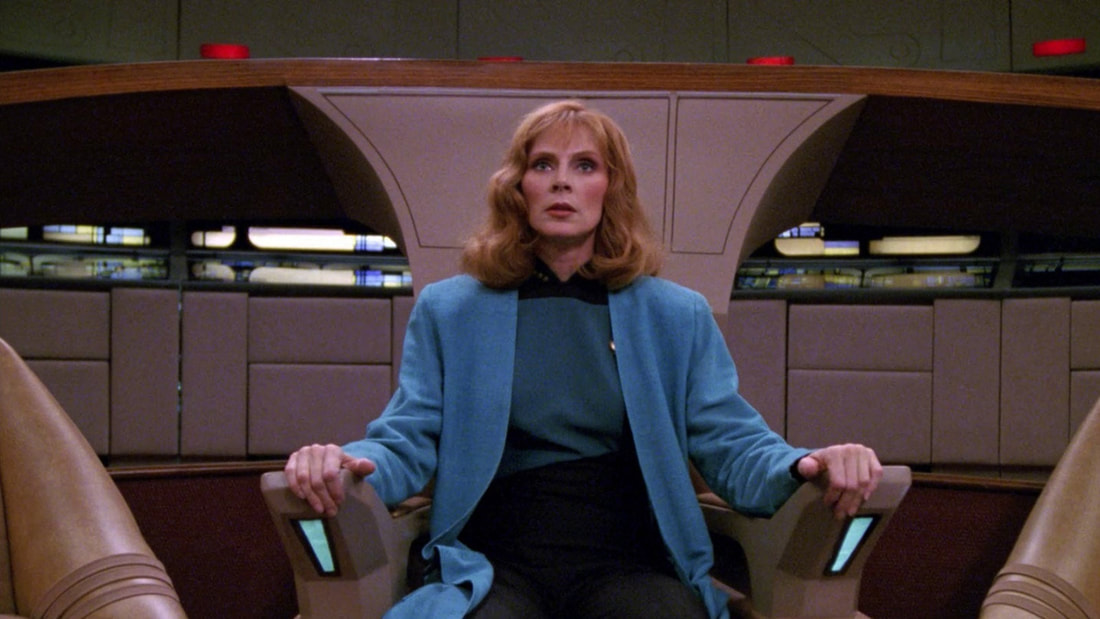
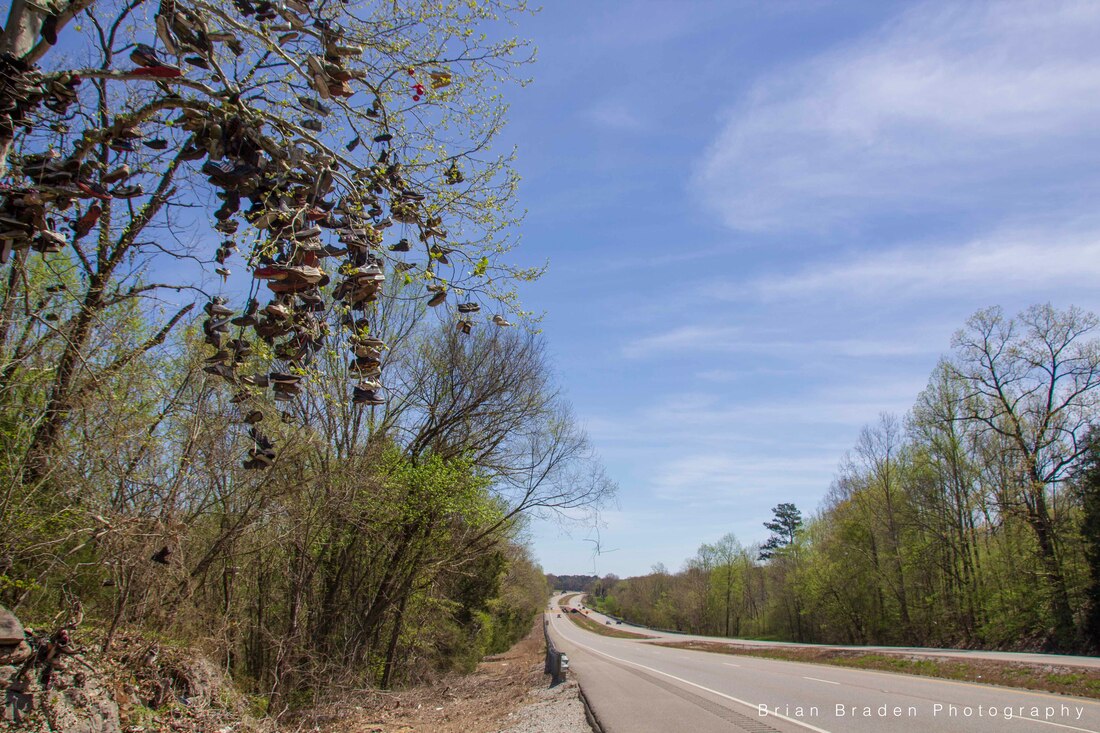
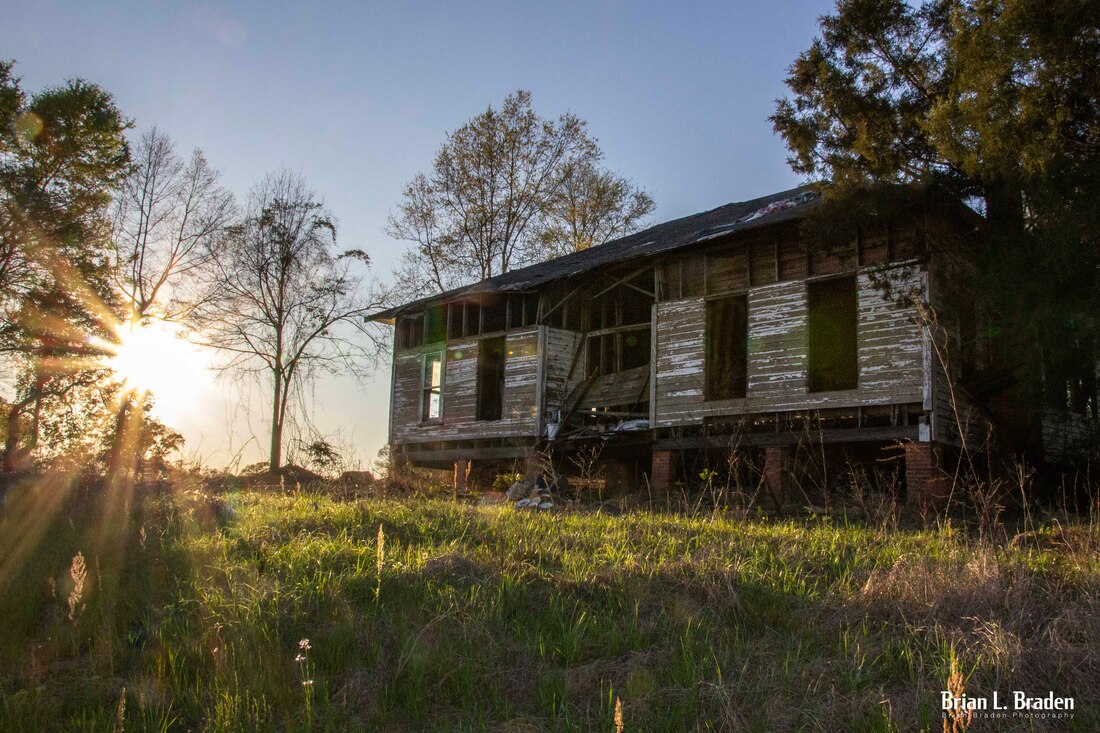
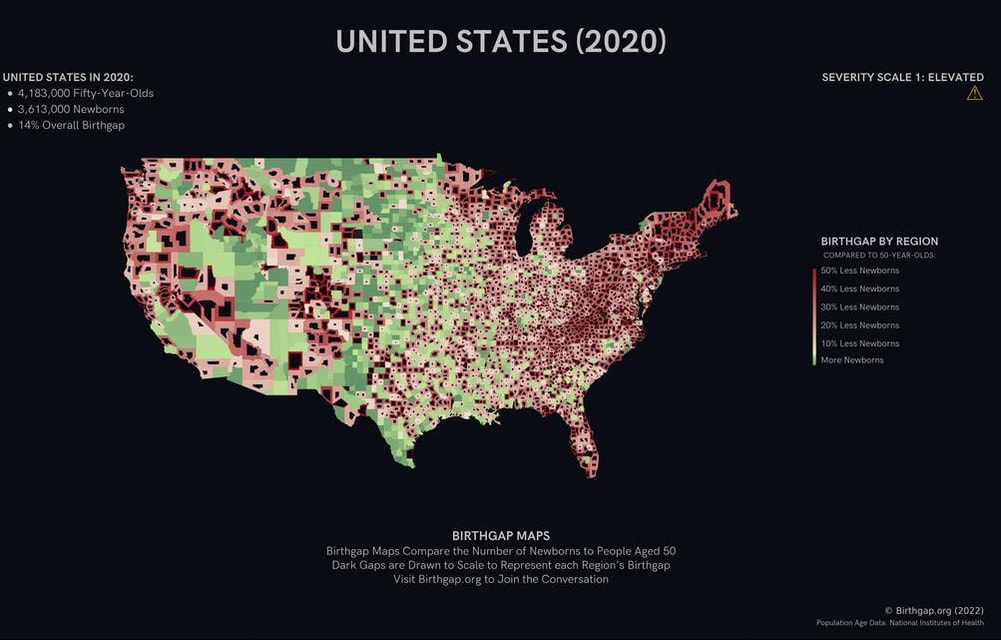
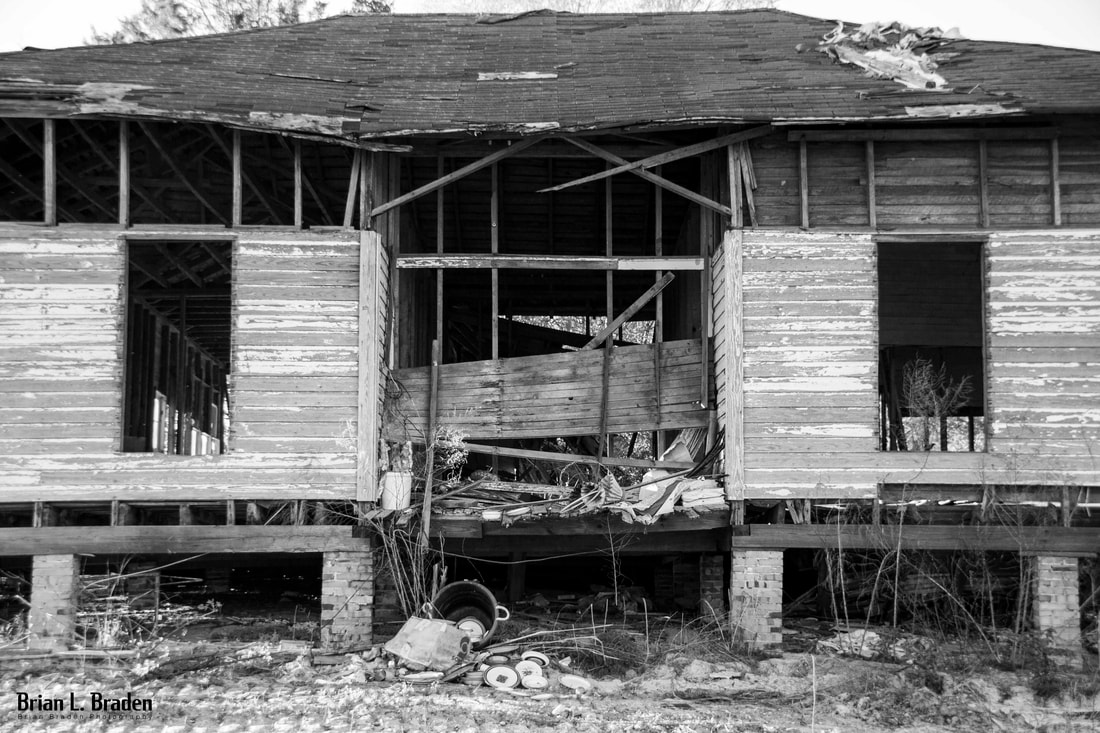
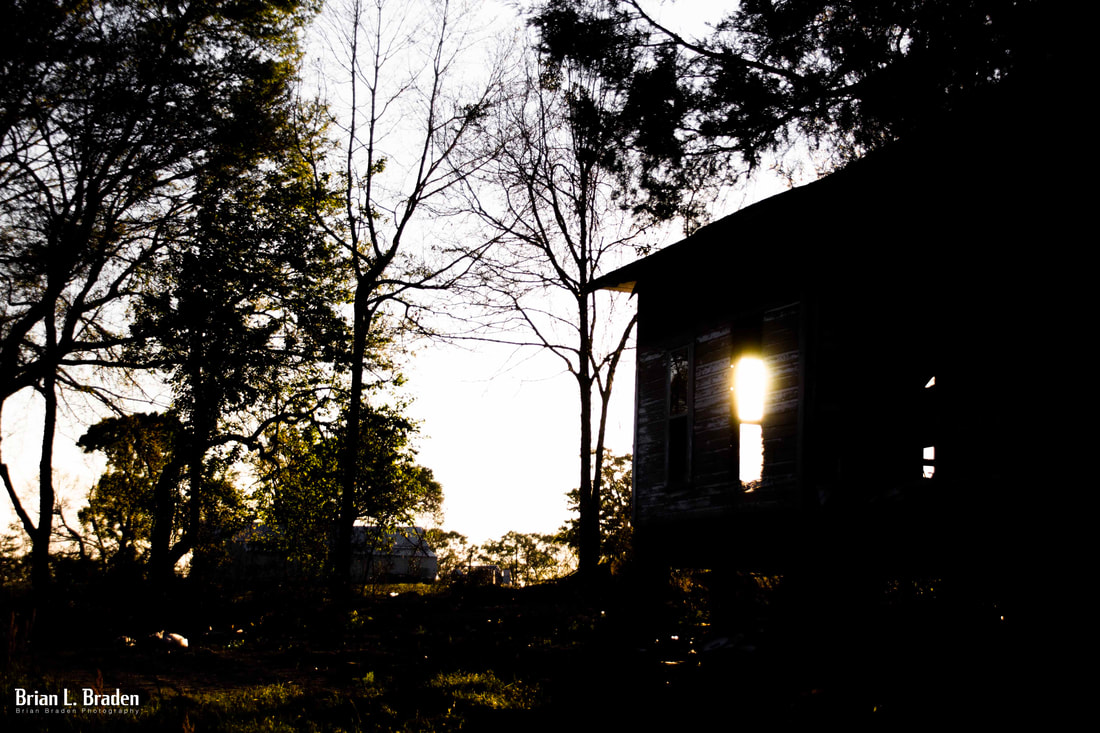

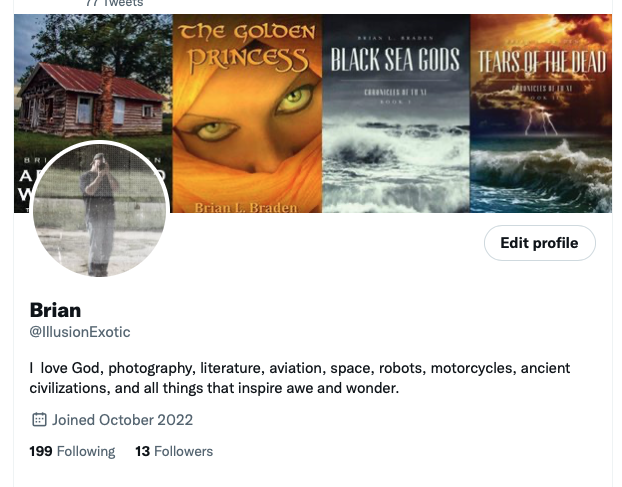
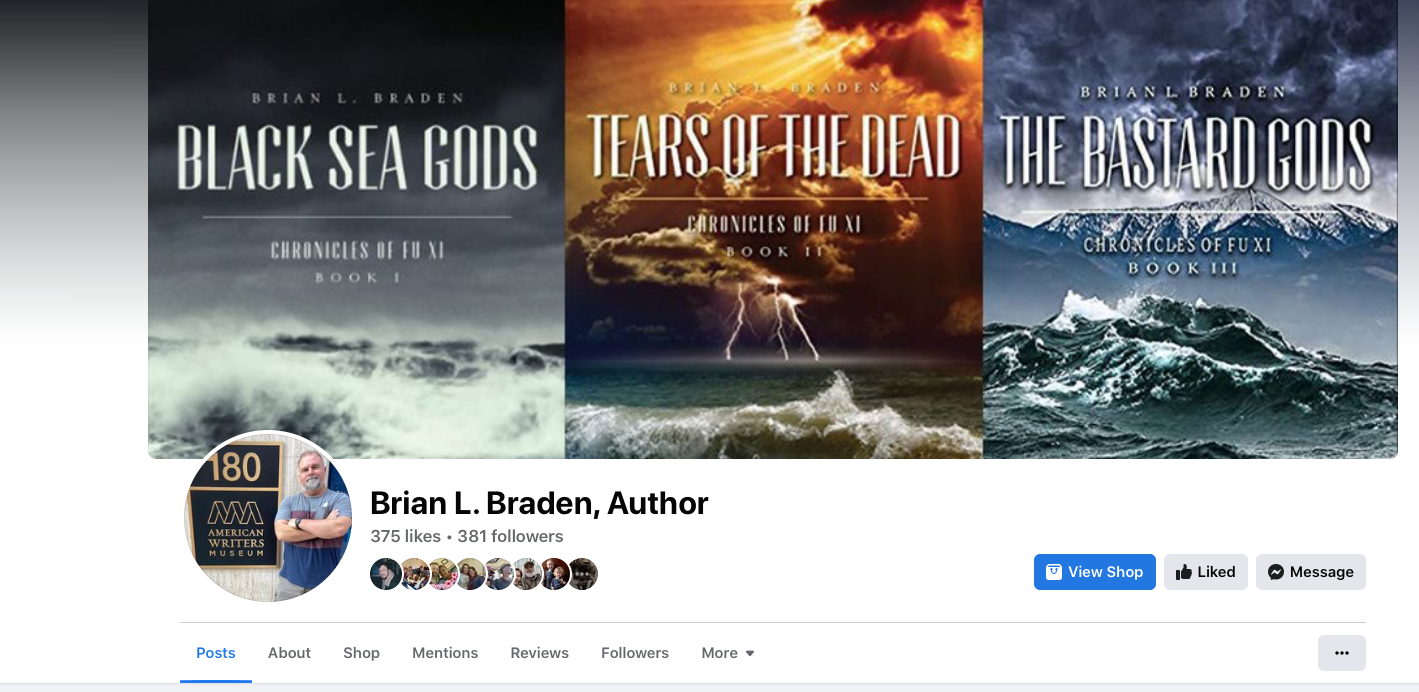
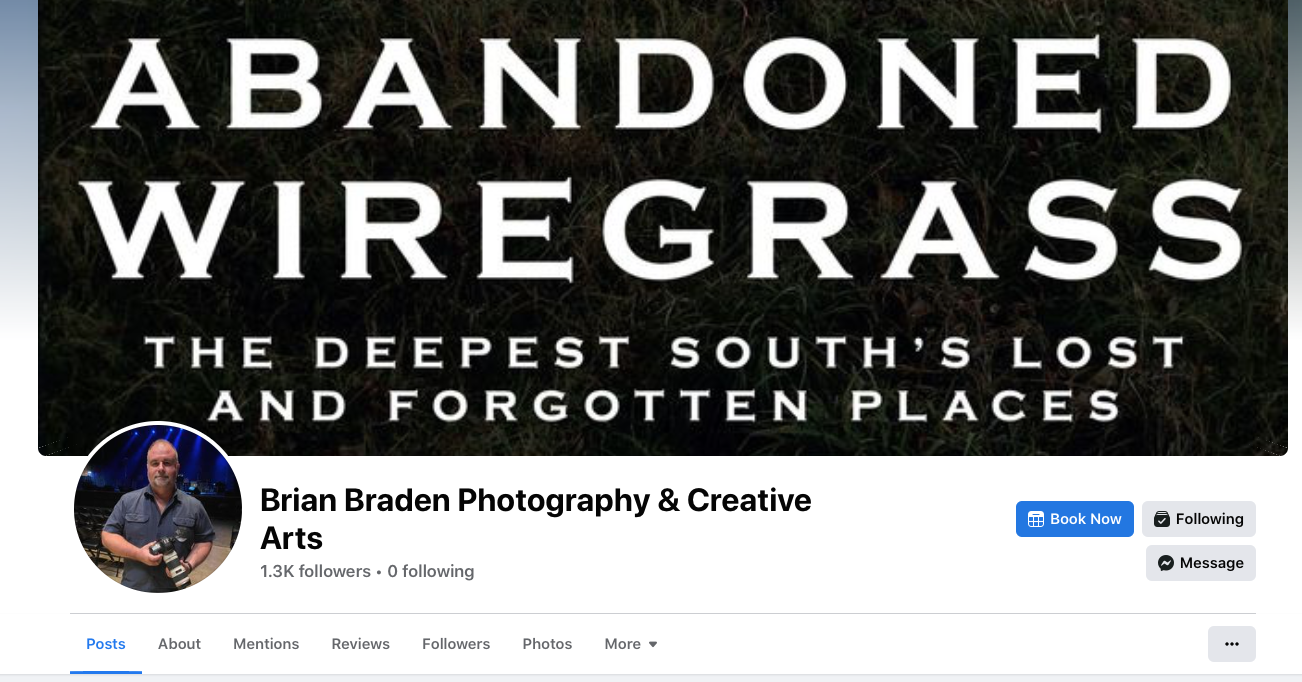
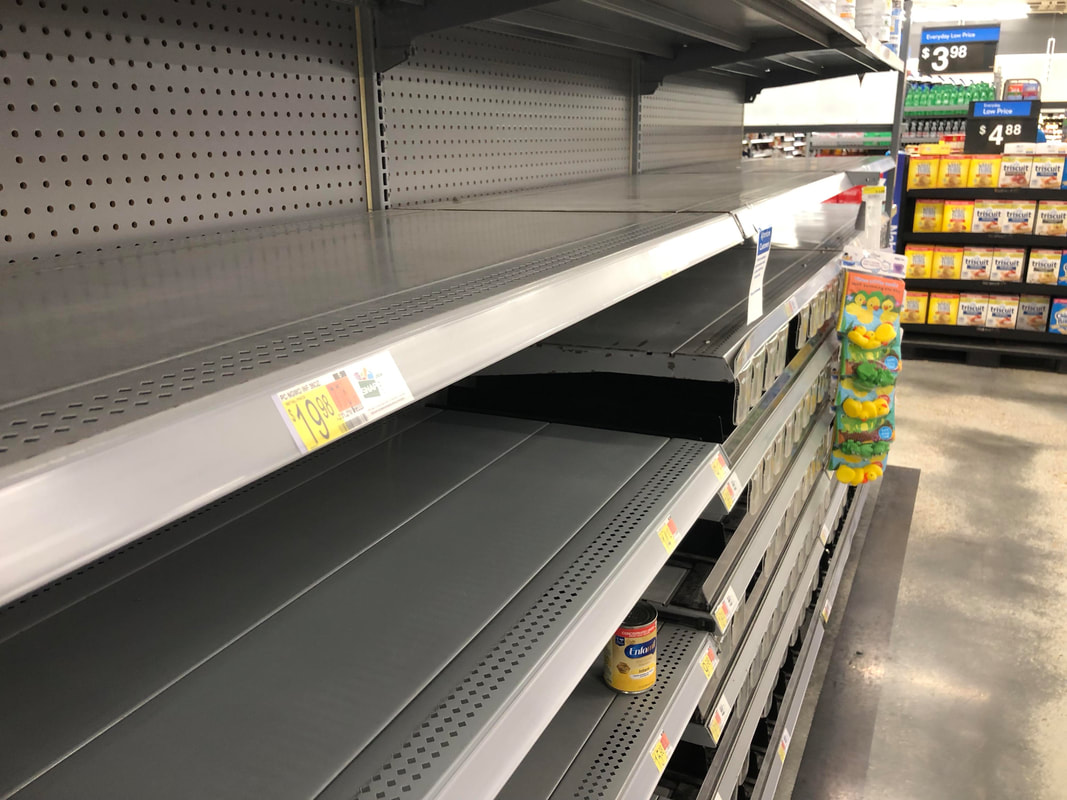
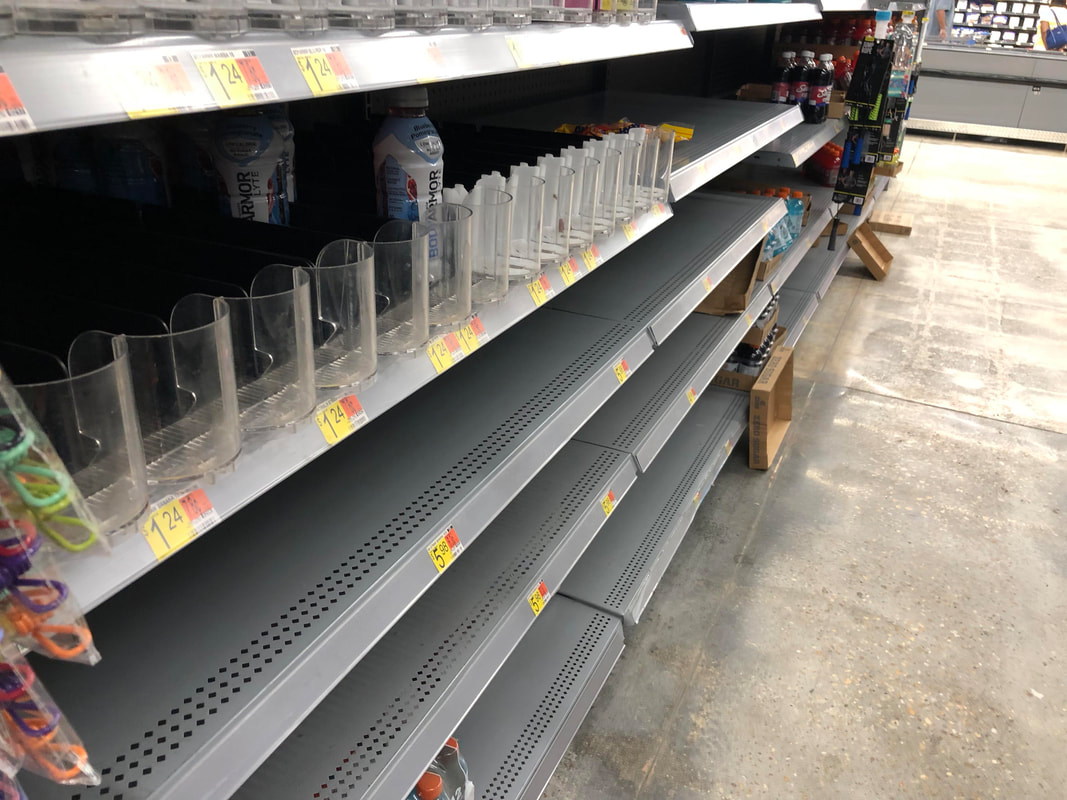
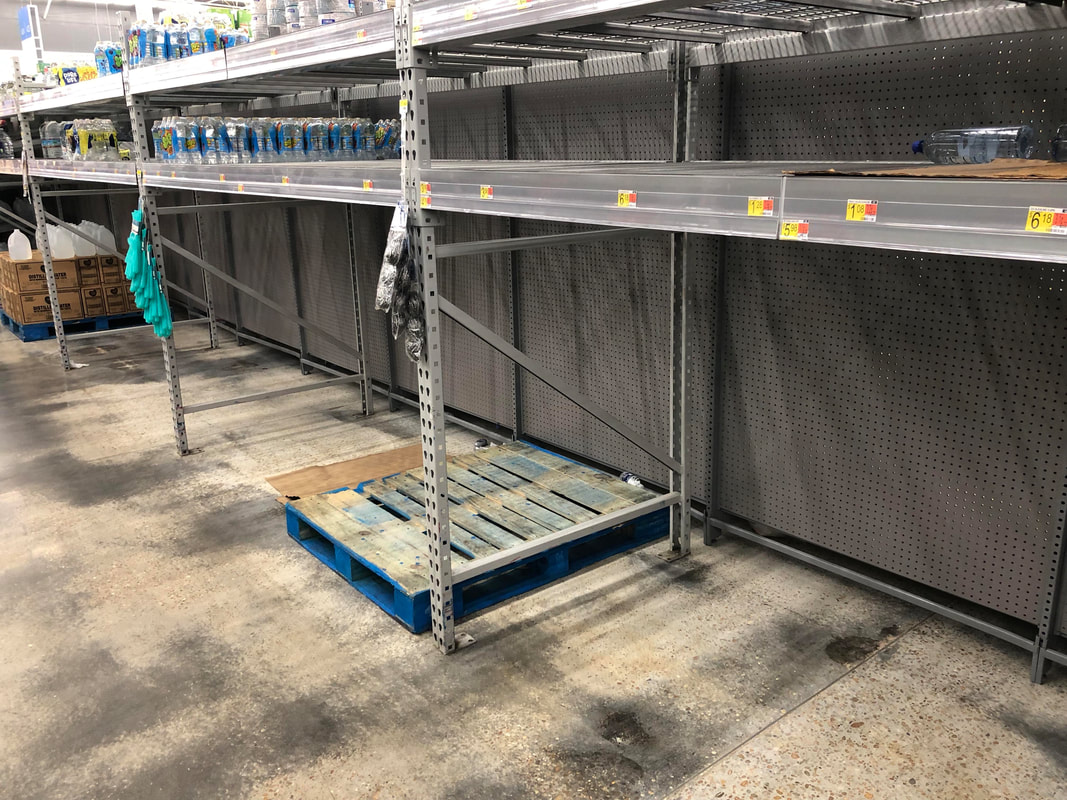
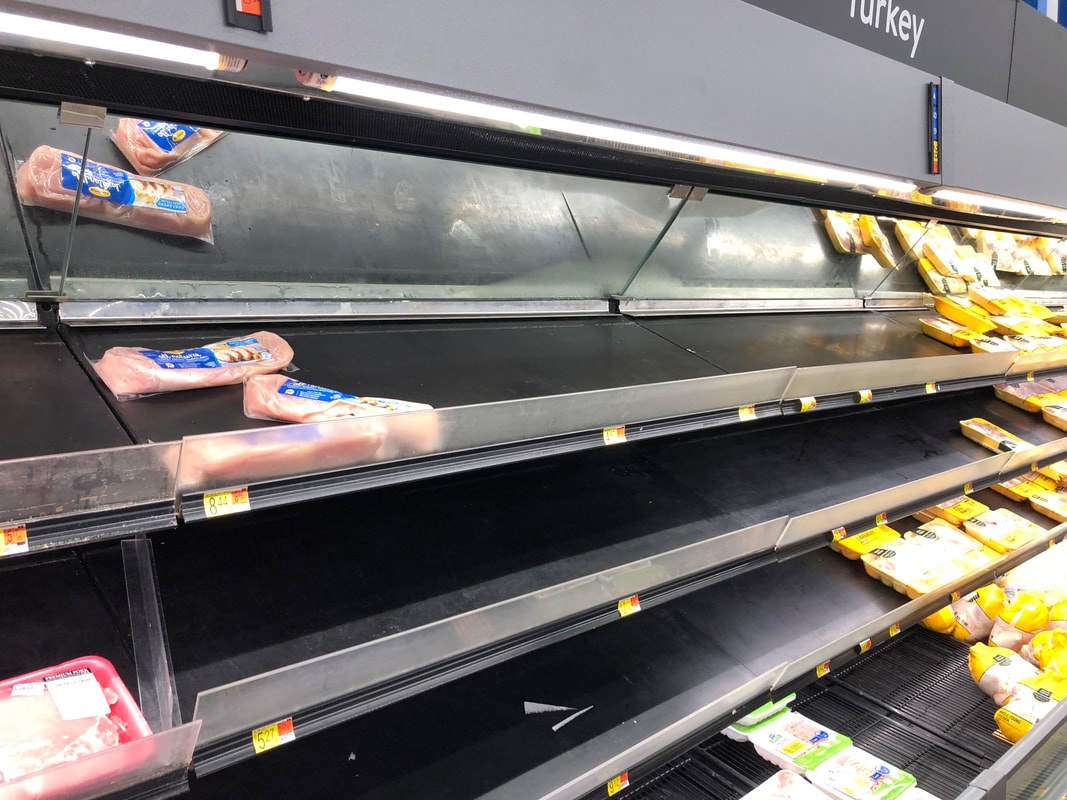
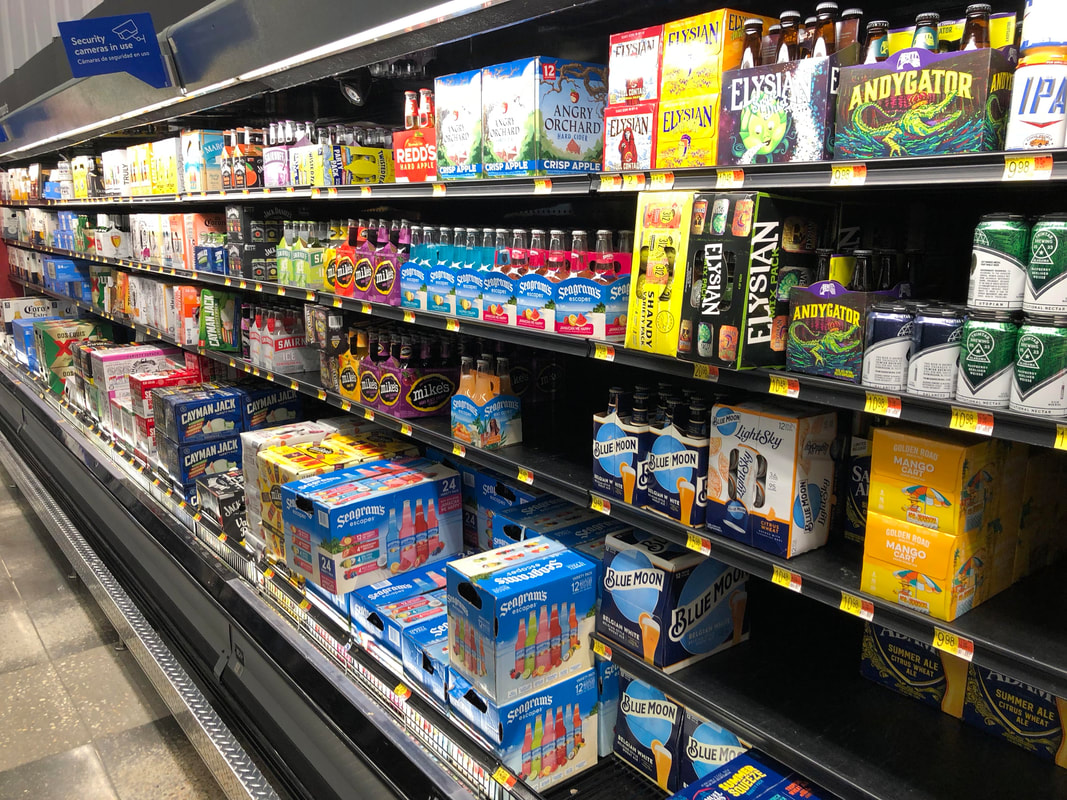
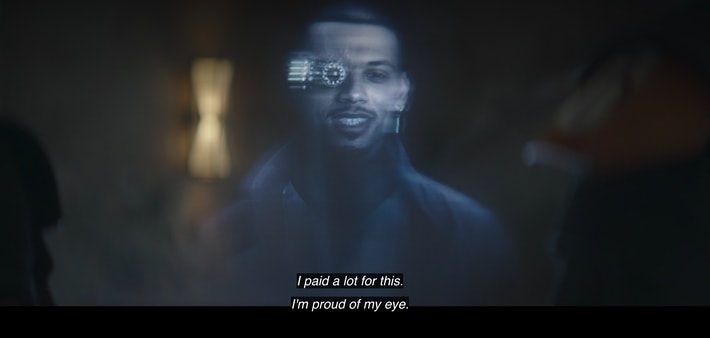
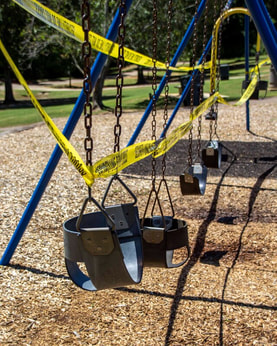
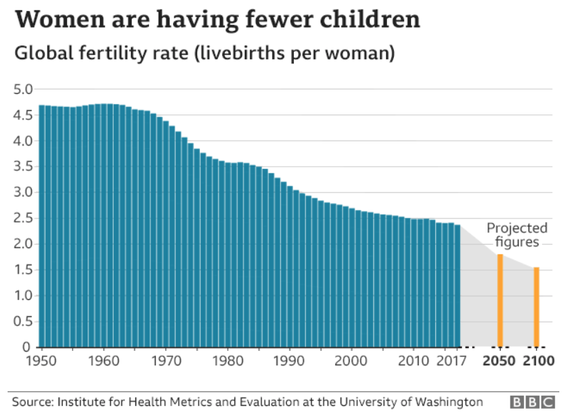
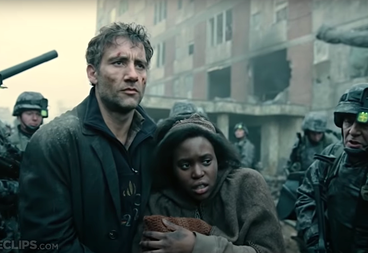
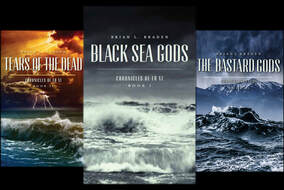
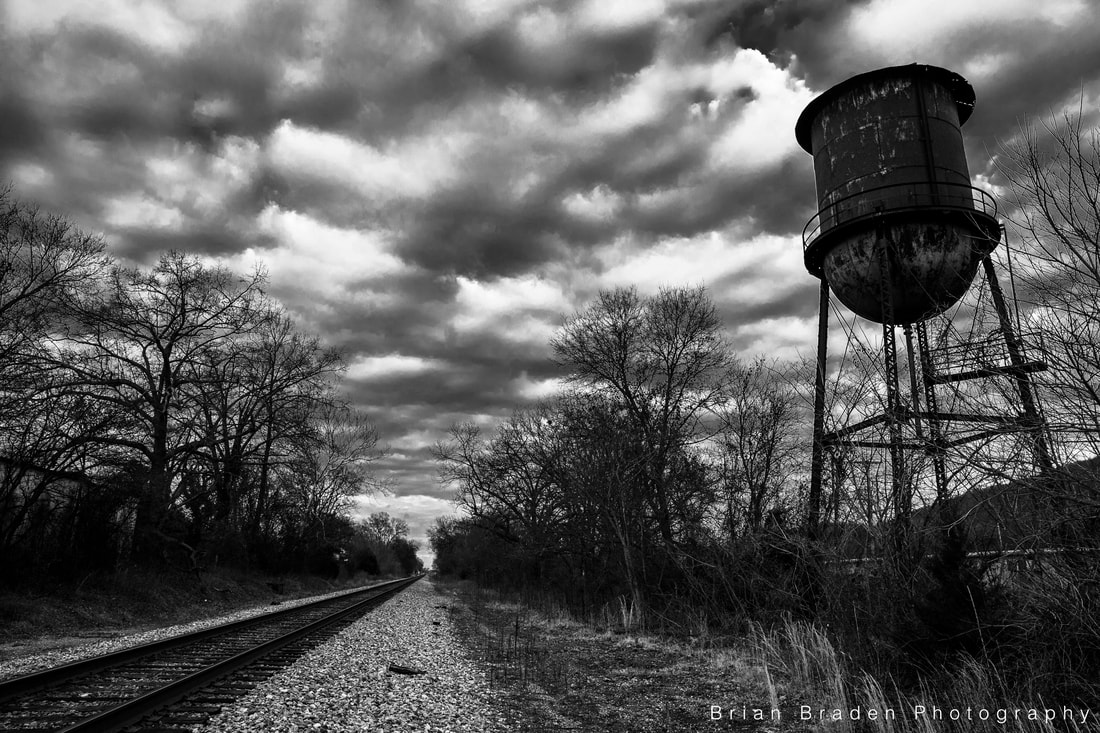
 RSS Feed
RSS Feed